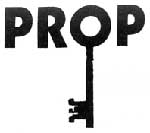
 |
Online
Archive
|
| Issue 10 - February 1973 |
| PROP |
 Recent unrest
in Britain's prisons brought nationwide publicity to a newly formed
organisation entitled PROP (Preservation of the Rights of Prisoners). Recent unrest
in Britain's prisons brought nationwide publicity to a newly formed
organisation entitled PROP (Preservation of the Rights of Prisoners).
Started by Dick Pooley, himself an ex-prisoner, PROP exists to help and represent prisoners, ex-prisoners and their relatives and to strive for the reform of Britain's penal system. PROP is not intended to be a political organisation but this is unavoidable when reform in prisons, rehabilitation of prisoners and even the need for prisons takes in the whole structure of our society. Most prisoners are inside for crimes of which personal gain was the motive. In a society where money is all important and we have television and advertising to drum this into us, it's not surprising to find that of those have-nots at the bottom of the class structure scale, many turn to crime as a way of getting what they've been told they need. In 1962 a survey showed that 97% of prisoners were said to be from working class, and many had been unemployed before arrest. Everyone should want to see social reform leading to a society where prisons were unnecessary, but this does not appear to be around the corner. However there are many changes that can be made immediately which would bring about a tremendous improvement in the situation. There are 40,000 prisoners in Britain today, for most it is not their first conviction. The lack of guidance and rehabilitation inside and then of material and spiritual help on their release merely means that the majority return to prison. When a man goes to prison he loses his liberty: but when he is released he often finds that he has lost his wife, family, friends and career as well, so he is demoralised and far more likely to return to crime. 'Prevention is better than cure' is a well known phrase used in connection with crime, but where is the cure? 'The criminal has to be punished' is the traditional view, so prisons are modelled to be a punishment when they should be the cure; the time used in the prevention of further crime.
The only thing we need here to copy the Dutch system is smaller prisons. PROP has a charter of rights for prisoners which could be easily adopted at the present. If adopted it would provide a good basis from which to work towards keeping men out of prisons and reducing crime. There are many obvious advantages in these proposals. It is not possible to cut a person off from the outside world and then expect him to return to it with ease. At the moment, a prisoner receives £4 on his release. Whilst inside he would have worked, possibly for as little as 30p a week. If he were to be paid a more realistic wage he would be in a much better position to face the world when he came out. Many long-term prisoners find that their wife has left them and this could easily be helped by placing him in a prison near his family home to avoid travel problems for visiting and by providing good visiting facilities. (In the United States some prisons have a scheme that enables the wife of long-term prisoners to stay with her husband for occasional weekends, in a specially provided flat within the prison. This relieves sexual frustrations on both sides of the prison wall.) These improvements could mean a stable family unit to come out to. Then there is further education which would benefit prisoners greatly, both while serving sentence and when they are released. In fact all of the proposed rights have very sound reasons behind them and would help prisoners, prison staff and the society the prisoner now feels so grudgingly towards. People outside of prisons rarely think of those inside, why they are there or whether they will be there again. This too is something that needs improving. PROP needs support in any way and can be contacted at 96 Victoria Road, Hull.
Charter of Rights Right to be a member of PROP, communicate with, elect or be elected
as, PROP representatives. The above are the demands made by PROP on behalf of prisoners. (Don) |